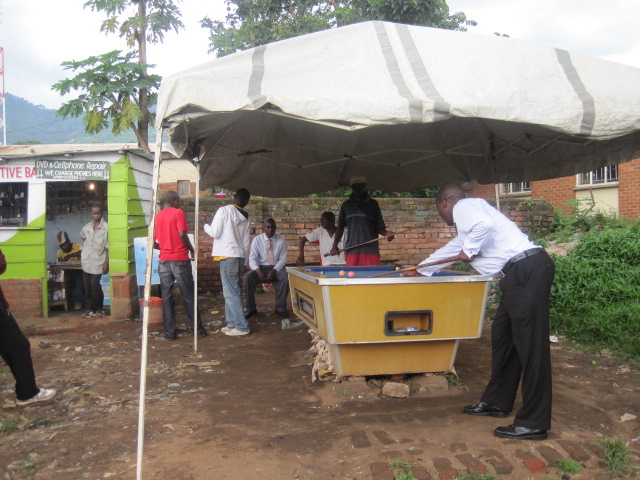I didn’t want to leave things on anything like a negative note (with the student riots and all), as my visit to Chancellor College and Malawi has been thoroughly productive and enjoyable. By way of thanks to the Department and University for hosting me (and to the CHS for sponsoring me), and to all the wonderful people I met on my two visits here, I post below some additional photos, and some student reactions to the Oresteia and Pasolini’s film before I head back to the States on Tuesday. A lot could happen between now and then, I realize (semper ex Africa aliquid novi . . .), but I wanted to give a sense of what it is like to be here, while I am still here, for those who have never visited sub-Saharan Africa. (In many ways, I think Malawi is fairly typical of the larger region.) By all means, come to Malawi if you can!
First, here are photos of the 12 students in my class.
 |
 |
 |
 |
| Austin Mustapher | Bernard Mkonkha | Bizwick Jefita | Fareeda Kimber |
 |
 |
 |
 |
| Gilbert Masano | Godfrey Kambewa | Stella Chikuta | Tamika Lowole |
 |
 |
 |
 |
| Joseph Naphini | Kissa Mphongolo | Mildred Chirwa | Noel Chilamba |
All were fabulous in their own way and worked very hard in this seminar. For the latter half of my time here all classes were canceled and the campus shut down due to the student protests, followed by a Lecturers’ sit-in for academic freedom. I decided to exercise some academic freedom of my own by holding classes anyhow—at my guesthouse. I was very gratified that all my students came to class in spite of the protests and sit-in. (Good thing, too, as we packed a semester’s worth of material into 4 short weeks. I do admit to bribing them with cookies, tea, and Fanta, though.) All wrote impressive essays on the Pasolini film vis-à-vis Aeschylus, but 4 students made observations I thought were particularly insightful. Here are excerpts. (I’ve added some brief comments in square brackets to contextualize.)
Kissa Mphongolo: “Pasolini, like Aeschylus, points out the importance of reason and persuasion in public discourse as essential in a democratic state. We see this in the case of the Furies, where the goddess Athena takes the leading role in persuading the Furies [to relent from their persecution of Orestes and their threats to harm the community]. People can come to a compromise after a conflict when there is some sort of persuasion. An example from within Africa that Pasolini uses in his film is the civil war in Nigeria over Biafra [in the 1960s]: it took an element of persuasion for the tribes to come to terms.”
Bernard Mkonkha: “The theme of stifling justice that predominates in the Oresteia, especially in Agamemnon and highlighted by Pasolini in his African Oresteia, is of paramount importance because by the time the film was shot many African countries had just attained their independence and the peoples’ expectation was that they would be led justly. That, however, was not to be because the African leaders who took over from the colonial masters did not rule justly. They used to muffle any voice of protest or dissenting views instead of listening. In Malawi, Dr. Banda was such a one. [N.B.: Banda was the first President, later Life President, of Malawi, under whom there was a one-party system and, while he was responsible for many infrastructure improvements to Malawi, his regime was autocratic and, to dissenters, repressive.] An example in the Oresteia of someone afraid to express himself is found when the watchman in Argos was musing to himself on the rooftop. In his words he indicated that there were other things that he would like to speak out [viz., his knowledge of Clytemnestra’s plot to kill Agamemnon], but for fear of reprisals he decided to remain quiet, since a great ox was said to stand upon his tongue, meaning that something was preventing him from saying everything that he knew.”
Godfrey Kambewa: “In his Notes, Pasolini states that it is hard to find the [sad, distraught, morose] Electra character in Africa. Well, I believe African girls meet difficult situations. They are born in male-dominated, oppressive, and often poor societies. They face burdens like war, hunger, rape, and poverty. These hardships make them strong. Their silence is not lack of strength. Behind it is a deep pain and strength the physical eye cannot fathom. Actually, most African girls could relate to Electra, who was hurt by her mother. The same applies to the African girl, who is also usually prey to family.”
Mildred Chirwa: “A central theme of the Oresteia is that justice should be preferred, at all costs, to revenge. Victims of civil war in African societies long for a day when all the injustices inflicted upon them will come to a total halt. Justice overrules revenge, since, as a solution, revenge worsens matters by giving back evil for evil. This in the long run causes immense human suffering. Ethnicity, tribalism, nepotism, corruption, among other things, only benefit a few individuals, just like the woman-avenging Trojan War benefitted Menelaus at the expense of thousands of old and young lives alike. Both the Pasolini film and the Oresteia emphasize the need for separating private interests from public interests on the part of African leaders.”
Finally, here are a few miscellaneous photos (most from my trip here in August with my wife and 14-year-old son, who takes much better pictures than I do):

A typical government-run secondary schoolroom, this one in Matiya Village. There are no desks. Students sit on the floor. Few have pencils or notebooks. Ages of students in secondary school can vary widely as placement is based not on age, but on level of achievement. Many students must take more than one hiatus from school due to lack of money for fees, or because of family responsibilities.

We were on our way to Liwonde National Park when the 1990 Toyota truck I borrowed from a friend was on the verge of overheating. This because we were driving down a very rutty dirt path—it was most certainly NOT a road—for about 16km through various villages in second gear and the radiator happened to have a small leak in it. As I was working on the truck, some curious children surrounded us. My wife and son kept them occupied by testing their counting skills, while a Good Samaritan helped me get water for the truck.

As I said, Africans do everything out-of-doors. The man in the white shirt was quite a pool shark. He sank six balls in a row from break.

I think this beautiful picture speaks for itself.

We spent a day in Matiya Village, the home village of a young friend we met in Zomba. There is a Catholic convent, hospital and church here. As we were wandering around, visiting the nuns, the nurses, my friend’s friends and relatives, etc., we came across a band of aged Maenads, who were dancing, clapping, and ululating with abandon. My wife, Caroline, got caught up with them, while I caught a glimpse of the joy and solidarity the ancient Greeks describe of participating in a chorus.

Two words: The future.

To commemorate our visit to Matiya—we were the first wasungu, or “white people,” many of the older folks had seen in several years; for most of the children, we were the first they had ever seen in the flesh—I was given a local chicken by the village headman. To get to this village we had to take a so-called mini-bus (really a 7-seater Toyota mini-van into which the drivers pack 18-20 people) for 5 miles to the town of Jali; then we traveled by bike taxi—not a rickshaw, but a regular bike with a makeshift seat on the back (though, admittedly, it was pretty comfortable)—for 16 more kilometers on a dirt track to the village. So naturally I had to carry that (live) chicken all the way home by the same route and the same method. (We raise chickens on our farm, so this was no big deal, though it was awkward when, on the way home, the chicken and I were crunched on the mini-bus next to a mother who was nursing her twins at both breasts.) Everyone was smiling and laughing at me and that chicken the whole trip back. Our cook prepared it for us for dinner that night. Yum—and what an honor!

This, too, speaks for itself.
